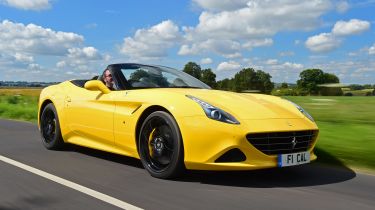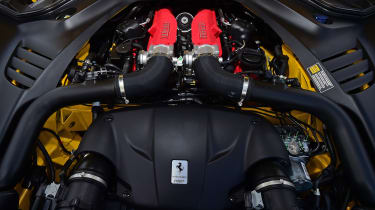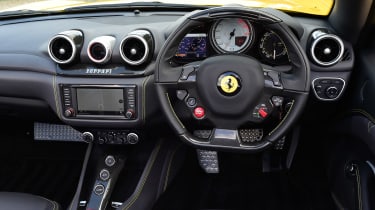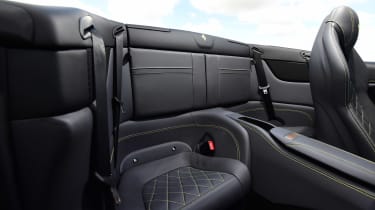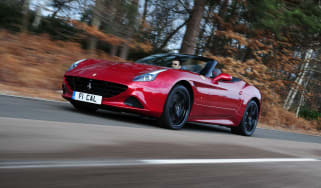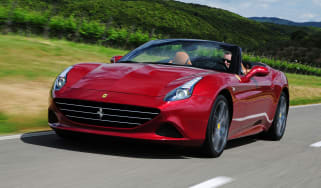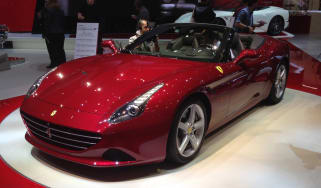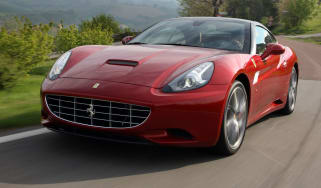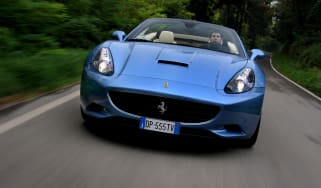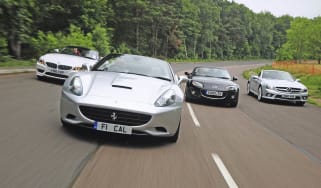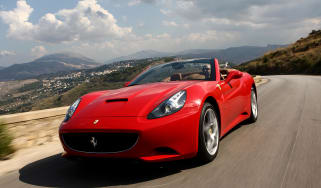Ferrari California T (2014-2018) review
It may be a boulevard cruiser, but the Ferrari California T has performance and handling worthy of its badge

When the first Ferrari California of the new generation appeared, it rattled Ferrari purists for being too soft, too flabby, too underpowered and not pretty enough. A series of upgrades have addressed all those issues, culminating in the restyled, turbocharged California T model we’re offered today. With the optional Handling Speciale pack added, the result is a genuine driver’s car with terrific performance, fine handling characteristics and a dash of everyday usability you might not typically associate with the prancing horse brand. It also comes with an electrically-operated hard-top that folds in 14 seconds for al-fresco Grand Touring, making it a great choice for high days and holidays.
The Ferrari California T takes on cars such as the Porsche 911 Turbo Cabriolet, Aston Martin Vanquish Volante and Bentley Continental GTC V8, with its combination of a powerful V8 mounted up front, a 2+2 seating layout and a folding metal hard top. It has a more relaxed character than the mid-engined 458 Italia, but it's by no means slow. It was launched as simply the Ferrari California (without the T) in 2008, and a mid-life refresh raised power from its 4.3-litre V8 by 30bhp to 483bhp, when 0-62mph improved to just 3.8 seconds.
Used - available now

2022 BMW
3 Series
15,529 milesAutomaticPetrol2.0L
Cash £27,197
2023 Kia
Sportage
17,934 milesAutomaticPetrol1.6L
Cash £27,176
2024 BMW
M135i
19,658 milesAutomaticPetrol2.0L
Cash £27,676
2024 Audi
A3 Sportback
13,242 milesAutomaticPetrol1.5L
Cash £24,476The model became the California T when it was restyled in 2014, and twin turbocharging was added along with a new downsized 3.9-litre V8 engine. Capacity might have gone down, but power leapt to 552bhp with around 30 percent more torque, and 0-62mph dropped again to 3.6 seconds.
The California T also features ceramic brakes for superb stopping power, and the original version was the first Ferrari to use a twin-clutch gearbox when it was launched in 2008. The latest upgrade, which arrived in 2016, is the Handling Speciale package. It comes with a few minor styling tweaks, but more importantly boasts stiffer springs and upgraded dampers – and a sportier engine note.
When the California arrived, it wasn’t met with the warmest reception from Ferrari fans. The first problem was the lack of a 12-cylinder powerplant, which was a core feature of the earlier generation California models. The metal folding top didn’t appeal to Ferrari purists either, and as for the later arrival of that turbo engine… traditionalists were spluttering in their sparkly prosecco.
But the California was never a car meant for Ferrari purists. It was a product designed to take advantage of the booming luxury goods market, and it’s gone down a storm with drivers for whom the brand means little more than exclusivity and aspiration – most of whom have never owned a Ferrari before.
Engines, performance and drive
Leave the Ferrari California in comfort mode and the engine is muted and the suspension supple, but on the right road this is still a true Ferrari. Since the original was launched updates have the weight and boosted power significantly, and the twin-turbo 3.9-litre V8 provides impressive acceleration with no hint of lag.
Turn the wheel-mounted Manettino switch to Sport, and the exhaust barks into life, the gear changes are sharper and the whole car feels more alert. The twin-clutch gearbox is a highlight too, with smooth auto shifts and super-fast changes when you use the paddles.
The Handling Speciale package can also be ordered, which adds even stiffer suspension and a faster steering rack. You need to unlock the more dynamic settings by moving the Manettino to Sport mode, as with the standard car, but the sharper steering – which also becomes noticeably weightier – and greater sense of security in fast corners make the HS package a worthwhile investment.
The ride suffers as a trade-off, of course, but you can twist the Manettino back to Comfort mode when you’re not in the mood. This changes the character of the car to a more lethargic and easy to drive cruiser, which will likely suit most California T owners most of the time.
Engine
The California T’s twin-turbo 3.9-litre V8 is a gem, offering extraordinary performance in what is actually quite a weighty GT car. Although it’s capable of generating monstrous amounts of torque, Ferrari engineers decided to limit the amount available in the lower gears – not because the running gear can’t handle it, but because there’s an expectation that a Ferrari engine should deliver a crescendo of muscle as the revs rise. The California certainly pulls that trick off with aplomb, and it’s a joy to ride the surge of torque as the engine stretches towards its 7,500rpm redline.
MPG, CO2 and Running Costs
Ferrari didn’t put a smaller, turbocharged V8 into the California to make it go faster… although with the new engine it does. The reason – as with all other ‘downsizing’ brands – is that society demands more social conscience from its supercars.
In the case of the California T, it means CO2 emissions have dropped from the 299g/km of the old model to 250g/km. That’s hardly going to save the planet, but then one wonders how a high performance, high consumption supercar crafted from rare and luxury materials could ever pretend to be making a serious contribution on that front.
Talking of consumption, Ferrari claims a ‘combined cycle’ figure of 26.9mpg – though of course driven with any passion, the car will return much smaller numbers. As a result of its emissions and price, anyone running a California T on a company is going to face a pretty impressive tax bill, but that’s par for the course at this end of the market.
And let’s face it, if it hurts to own a Ferrari, you probably can’t afford it anyway. As well as high fuel and tax bills, you’re going to be hit hard by consumable costs like tyres and brakes. At least the servicing is covered for the first seven years, and there’s a four year warranty too.
Insurance groups
A group 50 insurance rating means hefty premiums, especially for any owners who might not be considered the safest of bets. Many owners will save money by including their Ferrari on wider policies – their company fleet insurance, for example – and it’s always worth haggling with your broker.
Depreciation
Depreciation is a tricky issue for Ferrari owners, because while there are few cars out there so desirable to drive, it’s also true to say that high mileages can cost Ferrari owners a fortune at resale time.
Yes, most used Ferrari buyers are looking for a garage queen, ideally one that’s driven as far as the local dealer for its annual service, and then parked up again until the next year. As a result, many owners of more exotic Ferraris do just that.
As the most popular and attainable Ferrari, the California T is not likely to live such an existence, but owners must still beware of racking up too many miles. Used car experts CAP suggest a 30,000-mile car at three years old will be worth just under 50 percent of its new list price – and you can expect to knock the same amount off the value of any of Ferrari’s astonishingly expensive options.
To get an accurate valuation on a specific model check out our free car valuation tool...
Interior, design and technology
One of the difficulties with folding metal hard-tops is to create a sleek design with the roof up or down, but the Ferrari California has achieved just that. The first California (of this new generation) was not considered a looker in all quarters, but the swoopy exterior design was updated when the California T arrived, with every panel modified apart from the roof.
The new sleeker styling certainly turns heads, and is widely thought of as a successful upgrade. Nice touches include the stacked exhaust pipes and circular rear lights, which hark back to classic Ferrari models. The front end now also shares closer family design cues with the more exotic Ferrari F12.
The interior manages to combine technology and old-school luxury at the same time, and you get lashings of leather upholstery and a dash that’s more tactile and comfortably finished than some of Ferrari’s more hard-core sporting models.
It all feels impressively bespoke, but the California’s interior doesn’t have the rock-solid indestructible feel of a high-end Mercedes. And although the interior design is undoubtedly attractive and luxurious, it doesn’t have the cohesive design feel of some rivals either. Interior and dashboard design elements feel slightly ‘thrown together’, without the rigour and consistency you’d expect from a German luxury model.
Sat-nav, stereo and infotainment
Apple CarPlay is now on the Ferrari California’s agenda, which is a very welcome update for the typically well-connected owner of such a car. The system still doesn’t match up to the usability standards of top-notch mainstream providers, but Ferrari has never pushed the boundaries there anyway. Audiophiles (with deep pockets) will love the optional JBL Professional sound system, which comes with a dozen speakers and 1,280 Watts of output.
Practicality, comfort and boot space
The Ferrari California is billed as the Ferrari you can use every day, and it does have a surprisingly practical feel – although really only when judged by supercar standards.
The cabin is spacious for two, and the driving position good for a wide range of drivers. The engine noise – especially out of Sport mode – is muted by the turbochargers and refinement is pretty impressive too. This certainly isn’t a highly-strung exotic that will wear you out on a long journey, unless you’re driving fast with the roof down when things become a bit blustery.
Dimensions and size
The Ferrari California T is quite a compact car, measuring 4,570mm nose-to-tail and 1,910mm wide. It’s 1,322mm tall with the roof up. That means it’s a bit bigger in all directions than the Porsche 911 Turbo which is 4,507mm x 1,880mm x 1,294mm, and smaller than the Aston Martin Vanquish Volante which is 4,728mm x 1,912mm x 1,294mm. The Bentley GTC is bigger than all three at 4,806mm x 1,944mm x 1,397mm.
Leg room, head room & passenger space
While the front sports seats are figure-hugging but comfortable, the rear seats really are too small for regular use, although they do have Isofix child seat anchors. See them as extra luggage space though, and the California starts to make more sense – although with the roof down you don’t want to leave anything lying around on the back seat that might get sucked out into the slipstream!
Boot space
The two-piece roof folds into the boot in 14 seconds, and that still leaves 240 litres of space (there's 360 litres with the roof up), which is enough for a pair of weekend bags. The rear seats also fold down, which allows you to pass longer objects down the length of the cabin.
Reliability and Safety
Modern Ferraris are now beautifully made and a far cry from the temperamental older models - and there have been no major issues reported with the California. It should be strong in a crash too. Multiple airbags are fitted as standard, and in the event of an accident roll over hoops are deployed immediately to protect passengers. The standard-fit carbon-ceramic brakes provide enormous stopping power and resist fade even when worked hard.
That said, you won’t find many driver assistance type aids on the Ferrari’s options list, so look elsewhere if you want cross-traffic and blind spot alerts, lane-keeping assistance or radar-operated cruise control. It might be the most usable Ferrari, but it is supposed to be a driver’s car, after all.
Warranty
Ferrari outdoes most of its premium and exotic rivals with a warranty package that lasts four years, as long as you keep to the recommended dealer inspection regime.
Servicing
As part of its drive to make ownership as pleasurable and easy as possible, Ferrari includes an incredible seven years of ‘free’ servicing for its new models, although you do still have to pay for consumables such as oil, brake pads and filters. So it’s unlikely you’ll drive away from your Ferrari dealer service thinking ‘that was cheap’… especially if you’ve been talked into a retro-fitted Handling Speciale kit, or other upgrades.
